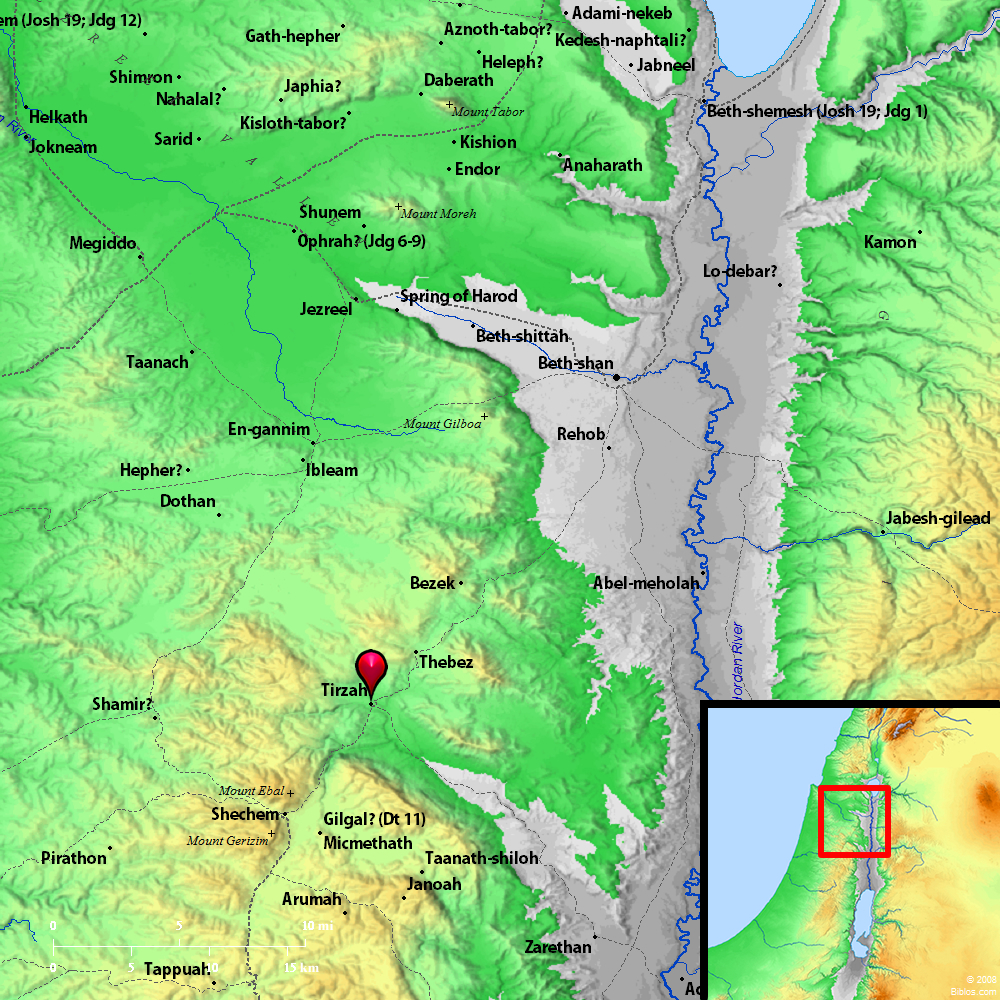Atlas

Tirzah and surrounding region
Maps Created using Biblemapper 3.0Additional data from OpenBible.infoOccurrences
Joshua 12:24 the king of Tirzah, one: all the kings thirty-one.
1 Kings 14:17 Jeroboam's wife arose, and departed, and came to Tirzah. As she came to the threshold of the house, the child died.
1 Kings 15:21 It happened, when Baasha heard of it, that he left off building Ramah, and lived in Tirzah.
1 Kings 15:33 In the third year of Asa king of Judah began Baasha the son of Ahijah to reign over all Israel in Tirzah, and reigned twenty-four years.
1 Kings 16:6 Baasha slept with his fathers, and was buried in Tirzah; and Elah his son reigned in his place.
1 Kings 16:8 In the twenty-sixth year of Asa king of Judah began Elah the son of Baasha to reign over Israel in Tirzah, and reigned two years.
1 Kings 16:9 His servant Zimri, captain of half his chariots, conspired against him. Now he was in Tirzah, drinking himself drunk in the house of Arza, who was over the household in Tirzah:
1 Kings 16:15 In the twenty-seventh year of Asa king of Judah did Zimri reign seven days in Tirzah. Now the people were encamped against Gibbethon, which belonged to the Philistines.
1 Kings 16:17 Omri went up from Gibbethon, and all Israel with him, and they besieged Tirzah.
1 Kings 16:23 In the thirty-first year of Asa king of Judah began Omri to reign over Israel, and reigned twelve years: six years reigned he in Tirzah.
2 Kings 15:14 Menahem the son of Gadi went up from Tirzah, and came to Samaria, and struck Shallum the son of Jabesh in Samaria, and killed him, and reigned in his place.
2 Kings 15:16 Then Menahem struck Tiphsah, and all who were therein, and its borders, from Tirzah: because they didn't open to him, therefore he struck it; and all the women therein who were with child he ripped up.
Encyclopedia
TIRZAHtur'-za (tirtsah; Thersa):
(1) A royal city of the Canaanites, the king of which was slain by Joshua (12:24). It superseded Shechem as capital of the Northern Kingdom (1 Kings 14:17, etc.), and itself gave place in turn to Samaria. Here reigned Jeroboam, Nadab his son, Baasha, Elah and Zimri (1 Kings 15:21, 33; 1 Kings 16:6, 8, 9, 15). Baasha was buried in Tirzah. Here Elah was assassinated while "drinking himself drunk" in the house of his steward; here therefore probably he was buried. Zimri perished in the flames of his palace, rather than fall into Omri's hands. In Tirzah Menahem matured his rebellion against Shallum (2 Kings 15:14). The place is mentioned in Songs 6:4 the King James Version, where the Shulammite is said to be "beautiful.... as Tirzah, comely as Jerusalem." The comparison may be due to the charm of its situation. The name may possibly be derived from ratsah, "to delight." Several identifications have been suggested. Buhl (Geographic des alten Palestina, 203) favors et-tireh, on the West of the plain of Makhneh, 4 miles South of Nablus, which he identifies with the Tira-thana of Josephus. He quotes Neubauer to the effect that the later Jews said Tir`an or Tar`ita instead of Tirzah, as weakening the claim of Telluzah, which others (e.g. Robinson, BR, III, 302) incline to. It is a partly ruined village with no spring, but with ancient cisterns, on a hill about 4 miles East of North from Nablus. This was evidently the place intended by Brocardius-Thersa, about 3 miles East of Samaria (Descriptio, VII). A third claimant is Teiasir, a fortress at the point where the road from Abel-meholah joins that from Shechem to Bethshan, fully 11 miles Northeast of Nablus. It is impossible to decide with certainty. The heavy "T" in Telluzah is a difficulty. Teiasir is perhaps too far from Shechem. Buhl's case for identification with eT-Tireh is subject to the same difficulty as Telluzah.
(2) One of the five daughters of Zelophehad (Numbers 26:33; Numbers 27:1; Numbers 36:11 Joshua 17:3).
W. Ewing




